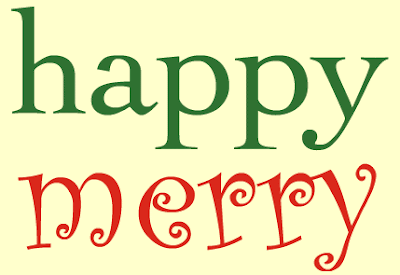
Daughter Number Three-Point-One tells me that it's pretty common among her Harry-Potter-reading peers to follow the British practice of wishing each other a "happy Christmas" rather than a "merry Christmas."
This got me to thinking about the difference between the two words. Merry is almost never used in the U.S. except in the context of "merry Christmas." I can imagine a context where one might say "He was making merry," but it would always include drinking alcohol.
Merry is clearly an archaic term, at least in the U.S., but even so, it seems more action-oriented, while happy seems like a state of being. Without checking a dictionary, I'd say happy's best synonym is content (even mildly joyful), while merry's would be cheerful.
One of my favorite social science factoids is that average Western parents, when asked what they want most for their children, answer that they should be happy, while parents from other parts of the world will come up with different wishes, generally. Western parents don't wish their children will be merry; happiness is an ongoing state, while merriment is a fleeting moment.
There are ways of using happy that diverge a bit from my train of thought. "Happy accident," for instance, where happy hews to one of its other meanings (fortunate), or even "happy to be here," where the closest synonym would be glad. Not to mention the suffix-type of use, such as "trigger-happy."
Oddly, in my opinion, all the dictionaries I just consulted list the first meaning of happy as something like "favored by luck or fortune." This fits the British use of "happy Christmas," I suppose, but I doubt it's what the average American parent has in mind when they say they want their child to be happy. They would all choose the second definition: "enjoying pleasure, satisfaction or joy."
Happy derives from the Middle English word hap, meaning chance or fortune. The Online Etymology Dictionary says:
[the] sense of "very glad" first recorded late 14c. Ousted O.E. eadig (from ead "wealth, riches") and gesælig, which has become silly. O.E. bliðe "happy" survives as blithe. From Greek to Irish, a great majority of the European words for "happy" at first meant "lucky." An exception is Welsh, where the word used first meant "wise."Clearly, this word has undergone a shift in its meaning
Merry, on the other hand, appears to be closely related to mirth, as well as well as the Old High German murg, which meant "brief."
So wishing your child will be merry might be inviting bipolar disorder (since if the mirth is only brief, what happens the rest of the time?), while happiness in its second meaning hits the longer-term desire for joy.
But if we were Welsh, we'd all be holding out for wisdom.


No comments:
Post a Comment